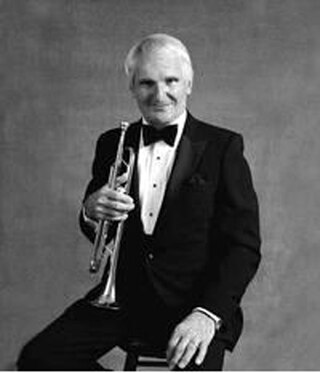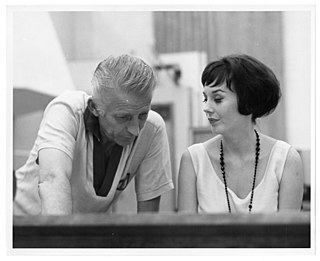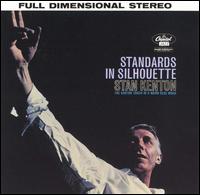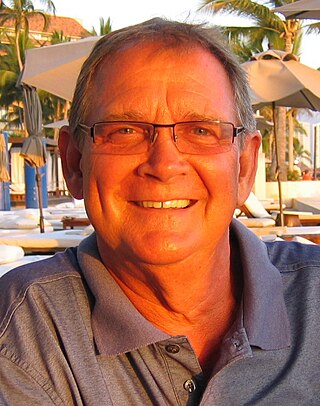
Walter Maynard Ferguson CM was a Canadian jazz trumpeter and bandleader. He came to prominence in Stan Kenton's orchestra before forming his own big band in 1957. He was noted for his bands, which often served as stepping stones for up-and-coming talent, his versatility on several instruments, and his ability to play in a high register.

Rocco Scott LaFaro was an American jazz double bassist known for his work with the Bill Evans Trio. LaFaro broke new ground on the instrument, developing a countermelodic style of accompaniment rather than playing traditional walking basslines, as well as virtuosity that was practically unmatched by any of his contemporaries. Despite his short career, he remains one of the most influential jazz bassists, and was ranked number 16 on Bass Player magazine's top 100 bass players of all time.

Stanley Newcomb Kenton was an American popular music and jazz artist. As a pianist, composer, arranger and band leader, he led an innovative and influential jazz orchestra for almost four decades. Though Kenton had several pop hits from the early 1940s into the 1960s, his music was always forward-looking. Kenton was also a pioneer in the field of jazz education, creating the Stan Kenton Jazz Camp in 1959 at Indiana University.

Secondo "Conte" Candoli was an American jazz trumpeter based on the West Coast. He played in the big bands of Woody Herman, Stan Kenton, Benny Goodman, and Dizzy Gillespie, and in Doc Severinsen's NBC Orchestra on The Tonight Show Starring Johnny Carson. He played with Gerry Mulligan, and on Frank Sinatra's TV specials. He also recorded with Supersax, a Charlie Parker tribute band that consisted of a saxophone quintet, the rhythm section, and either a trumpet or trombone.

One O'Clock Lab Band is an ensemble of the Jazz Studies division at the University of North Texas College of Music in Denton, Texas. Since the 1970s, the band's albums have received seven Grammy Award nominations, including two for Lab 2009. Steve Wiest directed the band from 2008 to 2014. Jay Saunders became interim director in 2014.

June Christy was an American singer, known for her work in the cool jazz genre and for her silky smooth vocals. Her success as a singer began with The Stan Kenton Orchestra. She pursued a solo career from 1954 and is best known for her debut album Something Cool. After her death, she was hailed as "one of the finest and most neglected singers of her time."

Gabriel Ruiz Hiroshi Baltazar Jr. was an American jazz alto saxophonist and woodwind doubler.

Ann Richards was an American pop and jazz singer. She was the second wife of bandleader Stan Kenton. She had a short career in the late 1950s and early 1960s.
Dewells "Dee" Barton Jr. was an American jazz trombonist, big band drummer, and prolific composer for big band and motion pictures. He is best known for his association with the Stan Kenton Orchestra.
William Reese Perkins was an American cool jazz saxophonist and flutist, popular on the West Coast jazz scene, known primarily as a tenor saxophonist.
Jay Saunders(néJohn Henry Saunders III; born 29 June 1944 Sacramento, California) is an American trumpeter and music educator at the collegiate level. In the 1970s, Saunders was a lead trumpeter with big bands — notably the Stan Kenton Orchestra — and a session musician in the Dallas area. Saunders recently retired from the faculty at the University of North Texas College of Music where he taught jazz trumpet, jazz recordings, and directed the One O'Clock Lab Band.

Willis Leonard Holman, known professionally as Bill Holman, is an American composer, arranger, conductor, saxophonist, and songwriter working in jazz and traditional pop. His career is over seven decades long, having started with the Charlie Barnet orchestra in 1950.
Ed Soph is an American jazz drummer and educator.
Jack Leroy Petersen is an American jazz guitarist and educator. He was a pedagogical architect for jazz guitar and jazz improvisation at Berklee College of Music, University of North Texas College of Music, and University of North Florida.
William Franklin Lee III, aka Bill Lee was an American jazz pianist, composer, arranger, author, and music educator who was renowned for pioneering comprehensive music education, including jazz, at the collegiate level. He led the University of Miami School of Music and was the University of Miami's third music school dean from 1964 to 1982.
Raymond Harry "Ray" Brown is an American composer, arranger, trumpet player, and jazz educator. He has performed as trumpet player and arranged music for Stan Kenton, Bill Watrous, Bill Berry, Frank Capp – Nat Pierce, and the Full Faith and Credit Big Band.

Standards in Silhouette is an album recorded in September 1959 by Stan Kenton and his orchestra. The entire set of arrangements for the LP were written by Bill Mathieu. This recording stands alone in approach and style; Kenton himself only plays on "Django" and every standard is done at a slow, ballad tempo with very sparse, effusive writing.

Robert Harry "Bob" Curnow is an American musician who served as a trombonist, staff arranger and producer for the Stan Kenton Orchestra during the 1960s and 1970s. As a composer and arranger he has become well known for large ensemble jazz music set to contemporary fusion and rock music of groups such as Chicago, Blood, Sweat and Tears, and the Yellowjackets. Most notably he arranged the music for and produced the award-winning and critically acclaimed CD, Bob Curnow's L.A. Big Band Plays The Music of Pat Metheny and Lyle Mays. His compositions and arrangements are heavily influenced by earlier writers for the Stan Kenton Orchestra such as Pete Rugolo, Bill Russo, Johnny Richards and Bill Holman. Curnow is currently owner and President of Sierra Music Publications, Inc., he is also prominent in the instrumental music and jazz education fields.

Kenneth Neil Slater is an American educator, composer, and pianist. In 2008, he retired as professor emeritus. He has composed over 80 works for jazz ensemble and has written for symphony, chamber groups, a cappella choir, opera, and musical theatre.

Adventures in Jazz is an album by the Stan Kenton Orchestra, recorded in late 1961 but not released until about a year later in November 1962. The album won a Grammy Award in the category for Best Jazz Performance – Large Group (Instrumental) category in 1963. This would be Kenton's second Grammy honor in as many years, the first being Kenton's West Side Story winning the Best Large Jazz Ensemble Album in 1962. Adventures In Jazz was also nominated for Best Engineered recording for the 1963 Grammys. The 1999 CD re-issue of Adventures In Jazz is augmented with two alternate takes from the original recording sessions and one track from Kenton's release Sophisticated Approach.